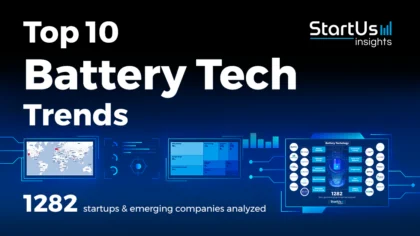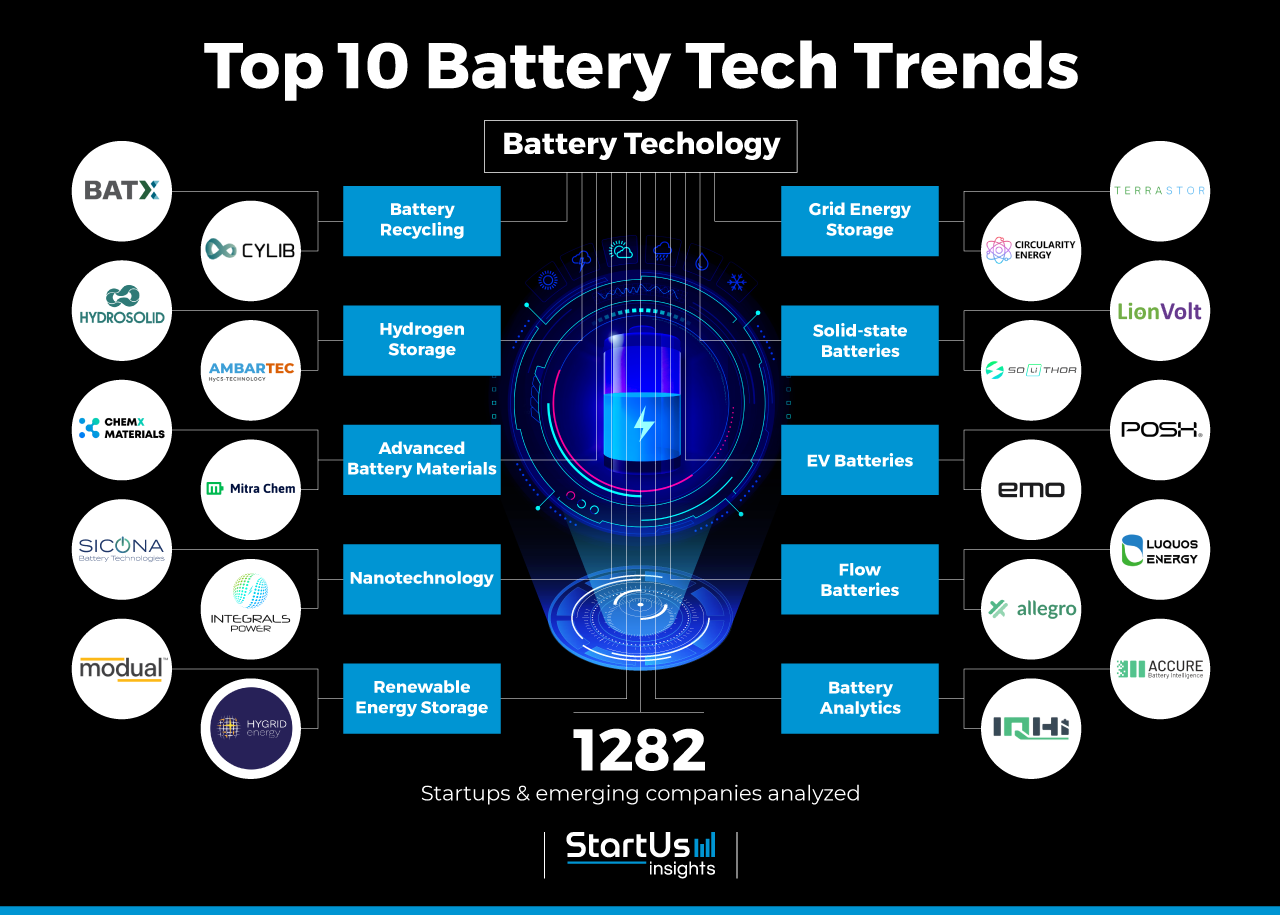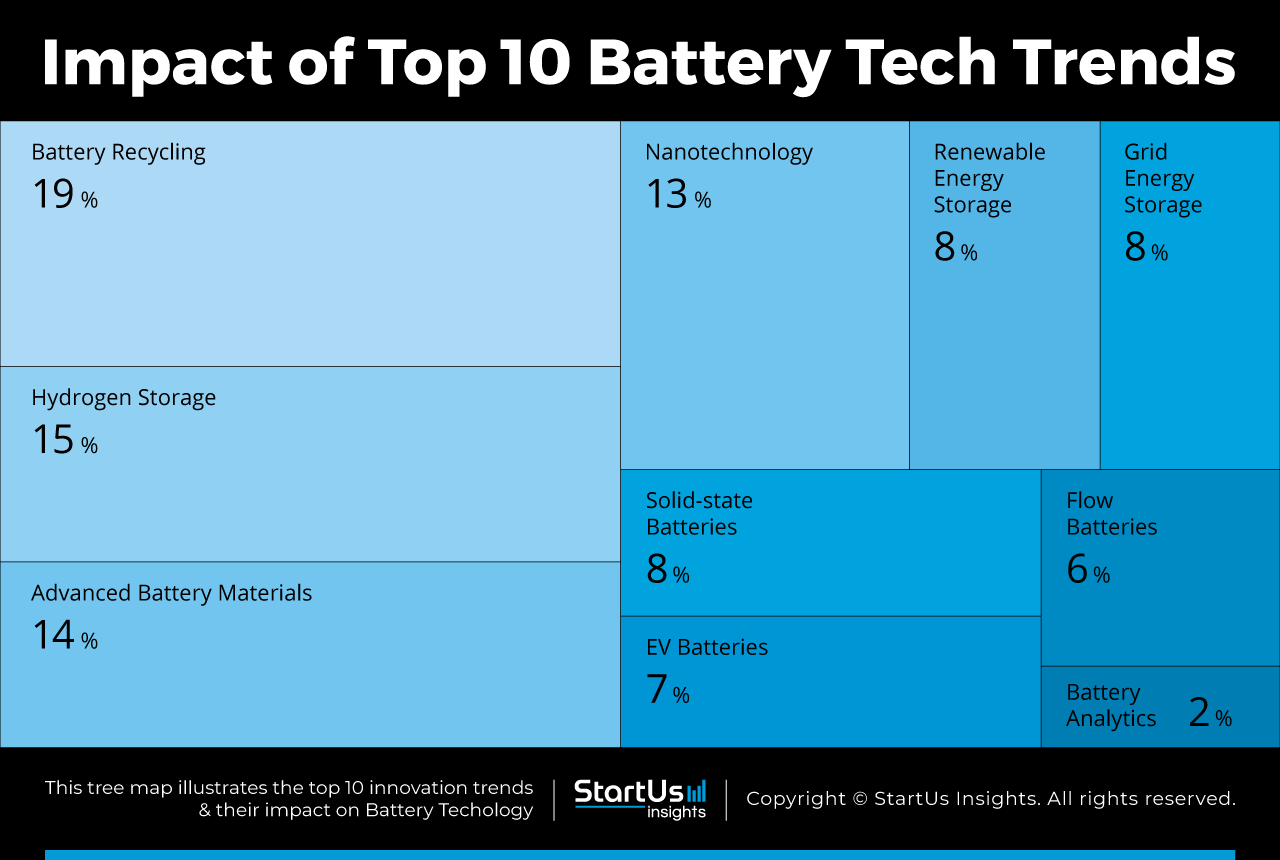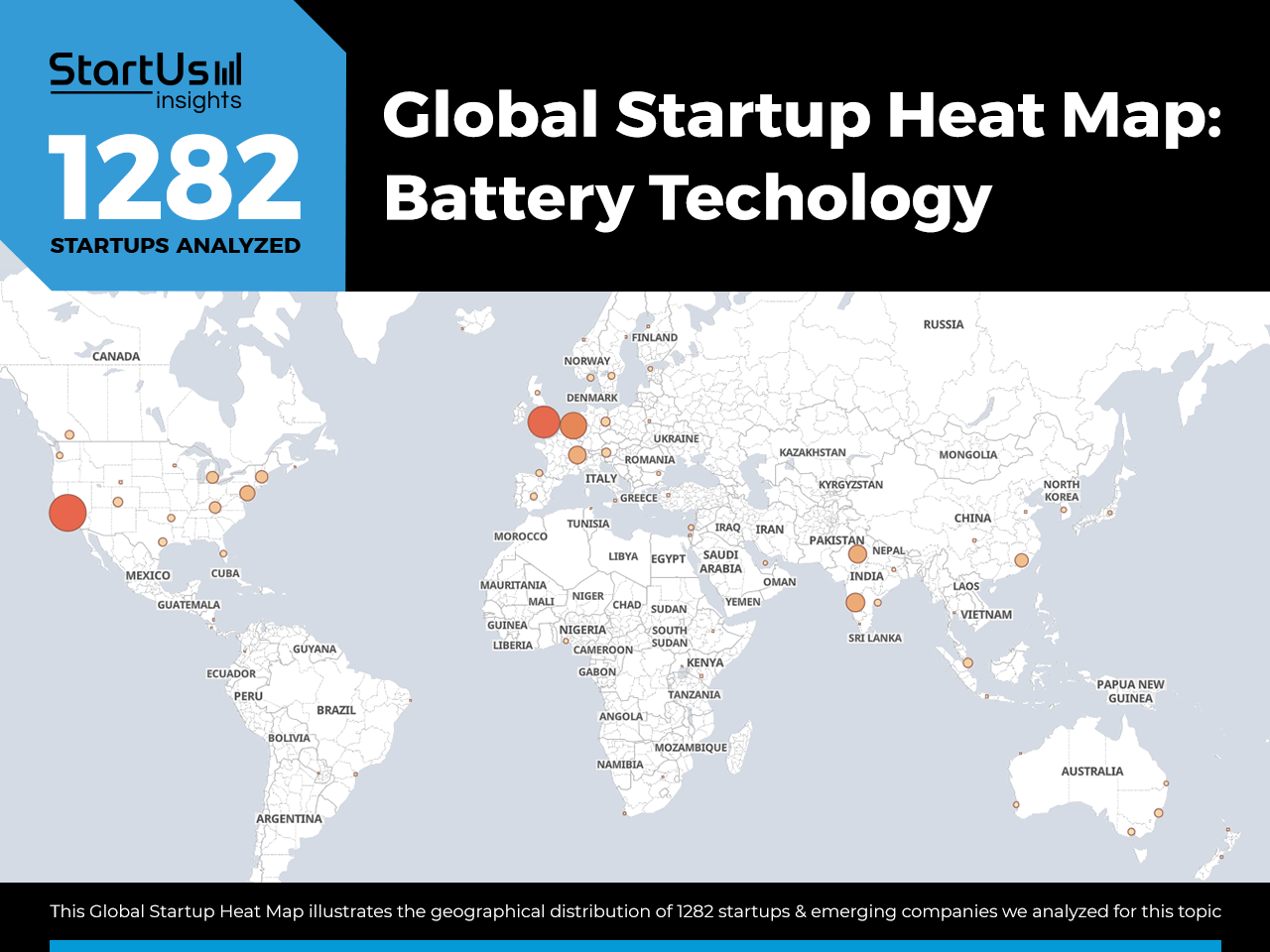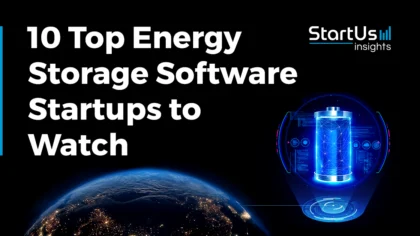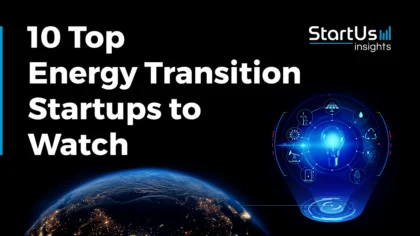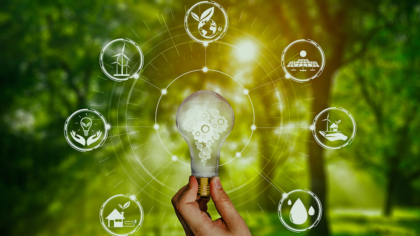Accelerate Productivity in 2025
Reignite Growth Despite the Global Slowdown
Technological advances enable manufacturers to meet the ever-increasing demand for batteries through sustainable and cost-effective methods. New materials and technologies are being developed in the battery manufacturing industry to create less expensive and more environmentally friendly solutions. Further, digitization of energy processes and reporting opens new opportunities to build the energy storage devices of the future. In this report, we examine the range of battery tech trends and high-impact startups forging a path to the future of green energy and energy storage.
This article was last updated in July 2024.
Innovation Map outlines the Top 10 Battery Tech Trends & 20 Promising Startups
For this in-depth research on the Top Battery Tech Trends & Startups, we analyzed a sample of 1282 global startups & scaleups. This data-driven research provides innovation intelligence that helps you improve strategic decision-making by giving you an overview of emerging technologies in the energy storage industry. In the Battery Tech Innovation Map, you get a comprehensive overview of the innovation trends & startups that impact your company.
Interested to explore all 1200+ robotics startups & scaleups?
These insights are derived by working with our Big Data & Artificial Intelligence-powered StartUs Insights Discovery Platform, covering 3 790 000+ startups & scaleups globally. As the world’s largest resource for data on emerging companies, the SaaS platform enables you to identify relevant technologies and industry trends quickly & exhaustively.
Tree Map reveals the Impact of the Top 10 Battery Tech Trends
Based on the Battery Tech Innovation Map, the Tree Map below illustrates the impact of the Top 10 Battery Tech Trends. Startups and scaleups are developing battery recycling, hydrogen storage, renewable, and grid energy storage solutions that are more sustainable and fill the gap in battery material supplies. Moreover, advanced battery materials, flow batteries, and solid-state batteries increase the energy density and charging speeds for various devices. Further, the implementation of nanotechnology in battery manufacturing increases the surface and size of battery electrodes to absorb more energy during charging and increase energy storage capacity. Finally, EV batteries reduce human dependence on fossil fuels, while battery analytics systems give consumers and manufacturers an overview of battery performance and health.
Top 10 Battery Technology Trends in 2025
- Battery Recycling
- Hydrogen Storage
- Advanced Battery Materials
- Nanotechnology
- Renewable Energy Storage
- Grid Energy Storage
- Solid-state Batteries
- Flow Batteries
- Electric Vehicle (EV) Batteries
- Battery Analytics
Global Startup Heat Map covers 1282 Battery Tech Startups & Scaleups
The Global Startup Heat Map below highlights the global distribution of the 1282 exemplary startups & scaleups that we analyzed for this research. Created through the StartUs Insights Discovery Platform, the Heat Map reveals high startup activity in Europe, followed by the USA, India, and China. Below, you get to meet 20 out of these 1282 promising startups & scaleups as well as the solutions they develop. These battery technology startups are hand-picked based on criteria such as founding year, location, funding raised, & more. Depending on your specific needs, your top picks might look entirely different.
Top 10 Battery Tech Trends in 2025
1. Battery Recycling
The growth of the battery manufacturing sector requires truly circular battery systems to reach sustainability and climate goals. Disposal of batteries by sending them into landfills creates significant environmental risks. Repurposing batteries for a second life, on the other hand, such as recycling EV batteries for static storage in EV charging infrastructure, reduces the environmental impact of battery disposal. Moreover, innovative processing technologies enable the automation of such processes and also decrease the demand for human labor. The significance and global impact of successfully creating highly efficient battery systems makes it the top battery tech trend in 2025.
BATX Energies implements Closed Loop Recycling
Indian startup Batx Energies implements net zero waste and zero emissions processes for recycling end-of-life lithium-ion batteries. The startup’s solution results in high-grade Black Mass, and secondary materials such as plastic, aluminum, and copper. In addition, its hydrometallurgical process enables the extraction of rare earth metals which are then reintroduced into the cell manufacturing supply chain. Moreover, BATX Energies’ solution reduces pollution caused by mining and also battery waste accumulating in landfills.
Cylib enables Additive-Free Battery Recycling
Cylib, a German startup, develops a pre-treatment process that reduces acids and additives in hydrometallurgical recycling. Its water-based method enables the extraction of graphite from lithium batteries while minimizing acid and additive usage. The startup’s process covers all stages from discharging to hydrometallurgical extraction, emphasizing sustainability by consuming less water. This facilitates the transformation of end-of-life batteries and production scrap into marketable products, contributing to a more environmentally friendly battery lifecycle.
2. Hydrogen Storage
One of the most efficient ways to complement battery applications is hydrogen storage. Startups are developing solutions to overcome the environmental impact of conventional batteries while creating more space-efficient solutions. Hydrogen allows vast amounts of renewable and readily available clean energy storage for long durations. Moreover, it boasts superior efficiency compared to fossil fuels, making hydrogen a more reliable alternative energy source. In addition, hydrogen cells have a far greater energy storage density than other alternatives. This offers a significant range advantage for EVs while occupying less space and being lighter.
HydroSolid develops Nanotechnology-based Hydrogen Storage
Austrian startup HydroSolid utilizes advanced space technology to store hydrogen in a substantially smaller amount, creating new requirements for applications that use hydrogen safely. The startup’s HIVE ONE is especially useful for the storage and transportation of hydrogen. Moreover, HydroSolid’s design features a robust honeycomb pattern, which makes it easier to handle for a variety of applications. In addition, HIVE ONE offers a long service life and more charging cycles than conventional batteries.
AMBARtec offers High-Density Hydrogen Storage System
German startup AMBARtec offers hydrogen compact storage technology. Its HyCS solution stores 2.5 to 5 times as much compared to traditional pressure vessels which makes it a highly compact storage system. Smart integration, particularly with steam-driven electrolysis (SOEC) and SOFC fuel cells, results in long-term power storage efficiencies. Further, it lowers transportation, generation, and storage costs by halving the space required for hydrogen storage.
3. Advanced Battery Materials
The increasing demand for battery technologies requires more energy storage capacities while being safe, cost-effective, and sustainable. Implementation of advanced materials in battery manufacturing ensures the above-mentioned standards and leads to innovation in battery technology. Startups are working on both traditional and new technologies to improve general performance and safety, lower the cost and environmental impact of production, as well as ensure high energy density. Moreover, the integration of new technologies into the existing manufacturing and maintenance facilities plays a crucial role in cutting costs and minimizing the environmental impact of batteries.
ChemX Materials produces High Purity Aluminium Cathode Precursor Salts
Australian startup ChemX Materials specializes in advanced materials technology for lithium-ion batteries. Its process technology, HiPurA, produces high-purity alumina cathode precursor salts and high-purity alumina (HPA) for lithium-ion batteries. Implementation of HPA further improves the battery life cycle and lowers self-discharge. Moreover, it provides greater thermal stability to the battery, lowering the possibility of batteries catching fire. Its battery separator technology especially improves the performance and safety of large batteries such as those for energy storage or electric vehicles.
Mitra Chem manufactures Iron-based Cathodes
Mitra Chem is a US-based battery materials startup building an iron-based cathode using platform technology that distinguishes cell performance by end-use from a specialized chemical. It implements machine learning (ML) models to accelerate cell qualification for cell testing. In addition, the application of ML throughout the entire production process shortens the R&D timeline significantly. Moreover, its technology demonstrates better performance on a scale of gravimetric energy density and cost, when compared to LFP and Ni/Co-based ternary cathodes.
4. Nanotechnology
In conventional batteries, the solids and liquids interact with each other to cause a low level of discharge. Introducing nanotechnology into the process as a coating to separate the electrodes from any liquid components of the battery increases its shelf life. In addition, the use of nanomaterials increases available power and decreases recharging time for batteries. Startups are working on technologies where nanocomponents save energy while having a self-contained power source, meaning that there is no need for an external charging element. Moreover, improved life cycles and energy storage reduce the environmental impact of batteries while also meeting the demand of consumers.
Sicona Battery Technologies develops Silicon-composite Battery Anode Materials
Australian startup Silicona develops innovative silicon-composite battery anode technology which enables electric mobility and renewable energy storage. The integration of nano-silicon with carbon and graphite allows for a low-cost and highly scalable production process. Moreover, the incorporation of composite polymer binders and silicon-graphite-carbon material substantially improves battery performance. Silicona’s anodes further improve cycle life, high conductivity, electrochemical stability, and rate capability. Further, its polymer binder is cohesive, elastic, conductive, and self-healing, avoiding the expansion or contraction challenges associated with higher silicon concentrations.
Integrals Power manufactures High-performance Battery Nano Materials
UK-based startup Integrals Power manufactures battery nanomaterials that are high-performance, scalable, and cost-effective. Its lithium-iron-phosphate and lithium-iron-manganese-phosphate cathode materials offer high capacity retention and discharge rates even under extreme environmental temperatures. Moreover, the application makes batteries more stable and have a longer lifespan. This enables their use in electric vehicles and large-scale energy storage systems. In addition, its scalable and low-cost technology contributes to creating a zero-carbon energy storage system.
5. Renewable Energy Storage
Renewables are an important part of battery storage since batteries can be charged by the electricity generated from renewable energy. However, renewable energy is not available around the clock which means it is not a constant energy source. Therefore, renewable energy storage has an important role as it allows energy from renewables such as wind and solar to be stored and utilized later when it is more in demand. In addition, excess renewable energy storage decreases greenhouse gas emissions and even covers peak demand, if developed to its potential globally. Moreover, the utilization of machine learning and artificial intelligence automates the process while reducing human errors.
Modual stores Renewable Energy
Swiss startup Modual specializes in sustainable energy storage utilizing second-life electric vehicle (EV) batteries. Its products includes Lite, Basic, Pro, and Grid, providing scalable and intelligent energy management solutions for residential, commercial, and industrial use. By storing renewable energy, the startup ensures a dependable power supply, cost reduction, and improved grid stability. This supports self-consumption, peak shaving, buffer storage, and emergency backup power.
HYGRID Energy offers Renewable Energy Performance Management System
Australian startup HYGRID Energy specializes in renewable energy and battery storage asset performance management systems. Its technology, Hygrid Supervisor, reduces the cost of renewable energy and battery storage systems management while increasing the performance and longevity of the assets. Moreover, it applies ML algorithms to manage the degradation conditions of different battery types. In addition, it provides efficient oversight of battery assets by utilizing the gathered data into effective actionable points. HYFRID’s highly integrated analytics and control interfaces allow users to work securely while enabling edge-based data control and acquisition.
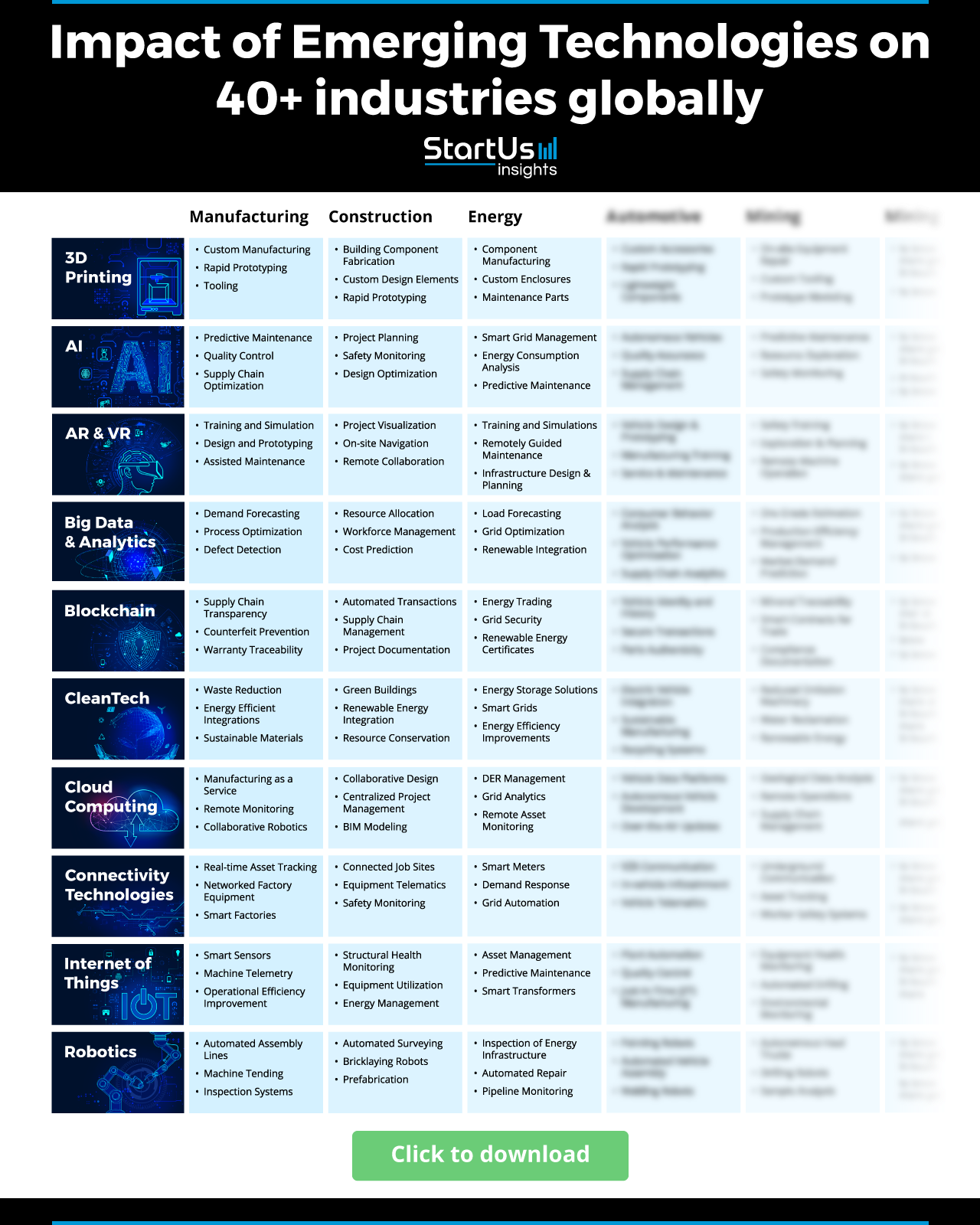
6. Grid Energy Storage
Another method of energy storage is grid energy storage which creates the ability for electric grids to reduce greenhouse gas emissions. Startups are working on new technologies to increase the output and storage duration of the energy generated. In addition, by taking advantage of the existing environmental conditions, such solutions also lower CO2 emissions. Moreover, grid energy storage strengthens the possibility to achieve energy independence by storing unused energy for future use. This in turn eliminates the need for continuous energy production which is usually expensive and unpredictable with non-renewable energy sources.
TerraStor develops Compressed Air Energy Storage (ACAES) System
US-based startup TerraStor develops grid-scale, long-duration energy storage systems which enable electrical grids to achieve 100% renewable penetration. Its highly efficient advanced compressed air energy storage (ACAES) systems offer 100+ MW in power output and 8 to 24 hours in storage duration. Being environmentally friendly, ACAES uses existing geology without disturbing land and using compressed air from certain geologic formations. This results in the elimination of half a ton of CO2 emissions from the electrical grid for each MWh of energy storage. Moreover, the technology diminishes installed capex ratios at increasing levels of output and storage duration.
Circularity Energy offers Nonlinear Energy Systems
The UK-based startup Circularity Energy offers nonlinear energy systems that allow the produced energy to be cycled and recycled across different levels of quality. Its energy ecosystem offers solar power energy storage that can react quickly to shifts in supply and demand. In addition, they analyze a location’s distinct energy-use fingerprint utilizing a tailored, data-driven methodology to help businesses save money and achieve sustainable energy independence. Moreover, its energy storage systems provide for the stabilization and balancing of the electricity output from renewable sources, ensuring that it is utilized as efficiently as possible.
7. Solid-state Batteries
One way to address the increase in energy demand is by building high-energy-density battery solutions. Solid-state batteries have higher energy density compared to traditional li-ion batteries. Moreover, they do not possess the same risk of explosion or catching fire, which eliminates the need for complex safety components and saves space, allowing for compact battery systems. Startups are currently developing solid-state batteries which lower the CO2 footprint, improve charging speeds, scale production, and improve battery performance.
LionVolt develops 3D Solid-state Batteries
Dutch startup LionVolt develops 3D solid-state batteries that are sustainable, deliver high performance, and fast charging. The startup’s batteries operate safely at elevated temperatures with no explosion or ignition risks. Additionally, it shows better performance with an energy density over 450 Wh/kg which enables the use of high-capacity materials. In contrast to conventional batteries, the implementation of green alternatives through circular LionVolt’s processes creates heavy-metal-free products.
SOLiTHOR develops nano-Solid Composite Electrolytes
Belgian startup SOLiTHOR manufactures solid-state lithium batteries. Its nano-Solid Composite Electrolyte (nano-SCE) is a non-sulfide, oxide, or polymer that does not require high operating temperatures to achieve high lithium-ion conductivity. The liquid-to-solid process results in a drop-in solid electrolyte that enables manufacturability without the need of rebuilding cell product lines. Moreover, its technology improves energy density, charging speeds, and, most importantly, safety while retaining manufacturability.
8. Flow Batteries
Increasing the use of batteries in everyday life results in more battery waste. In this case, the application of flow batteries, which are far greener and more durable than traditional li-ion batteries, is becoming a top battery tech trend. Moreover, very low concentrations of toxic metals such as zinc, lead, cadmium, and nickel make them more environmentally friendly. In addition, greater flexibility to tailor energy rating and power rating independently for a given application results in systems with longer battery life. Startups are working on nontoxic, non-corrosive, and pH-neutral materials to manufacture batteries that are scalable and available for any storage duration and environment.
Luquos Energy manufactures Eco-friendly Flow Batteries
Hong Kong-based startup Luquos Energy manufactures eco-friendly flow batteries from earth-abundant materials. While having no limitation on discharge time, its safety is also provided by nontoxic active materials and nonflammable aqueous electrolytes. In addition, the flow battery systems have better life performance, while being scalable and integrable into large industrial systems. Moreover, being cost-efficient and having longer cycle life, it offers an uninterrupted source of power supply, useful for applications in EV solar chargers, microgrids, and power grids.
Allegro Energy manufactures Redox Flow Batteries
Australian startup Allegro Energy manufactures redox flow batteries. Its flow batteries are useful for long-duration energy storage, being able to store more than four hours of energy while being adjustable to suit any environment. Higher energy density allows the batteries to use much less space compared to other traditional battery technologies which leads them to have a smaller carbon footprint. The startup’s water-based electrolyte is non-corrosive and pH neutral which makes it adjustable to suit any environment and storage duration. Unlike conventional lithium-ion cells which typically stagnate, Allegro’s solid-state battery cells penetrate the 800 Wh/L ceiling.
9. Electric Vehicle (EV) Batteries
The shift towards sustainability and carbon neutrality requires vehicles to become more efficient and environmentally friendly. Continuous mining of non-renewable natural materials leads to soil and air contamination which strengthens the need for high-quality EV battery technologies. In addition, EV batteries that are reusable and recyclable create a circular economy which also removes the need of sourcing more valuable or virgin metals. Moreover, increased safety features, such as short circuit protection and thermal management systems, also contribute to the longevity of EV battery packs.
Posh Robotics manufactures Recyclable EV batteries
US-based startup Posh Robotics manufactures reusable and recyclable batteries. Its automation solution allows for the designing of reusable battery packs to enable disassembly, reuse, and recycling. Further, it makes the disassembly process safe, scalable, and efficient while creating a circular economy for EV batteries. Moreover, the startup develops second-life solutions for EV batteries that are retired but still contain 80% of the original capacity and are still loaded with valuable materials.
EMO manufactures Fast Charging, Portable, Water and Fireproof Electric Battery Packs
Indian startup EMO specializes in manufacturing fast-charging, portable, and water- and fire-proof electric battery packs. ZEN PAC ensures fire safety with its built-in direct thermal management system to extract heat from the source cell and reject it externally. In addition, the startup’s AI prediction model enables the implementation of monitoring as well as neutral data analysis. Further, the battery pack’s wire-bonded cell connections and 6D suspension mounting provide cell-level fusing and short-circuit protection together with impact absorption and vibration isolation.
10. Battery Analytics
To improve efficiency and reduce risks, manufacturers are increasingly implementing battery analytics. These tools provide data processing capabilities and inform about battery performance and health via AI algorithms and reports, interactive models, and predictions. Moreover, emerging startups are working on self-discharge testing, making the process faster than traditional methods, and reducing the costs and labor requirements. Further, these new solutions and technologies accelerate the battery production and evaluation processes with valuable predictive analytics features.
Accure analyzes Battery Field Data
Accure, a German startup, develops an advanced cloud platform that harnesses battery field data. Its platform extracts critical parameters such as open-circuit voltages, complex impedances, and active lithium loss. Leveraging this data, the startup creates digital twins of batteries. The platform’s safety module compares battery behavior against millions of similar cells, promptly alerting users to irregularities. This approach prevents issues like internal short circuits, gassing, and delamination. Further, Accure’s battery health module assesses individual battery performance, offering early predictions of degradation.
IQHi develops Battery Monitoring Systems
US-based startup IQHi develops battery monitoring system IntelliBatt. Users upload and manage data through a cloud-assisted data storage service which allows them to run data inspection and battery fault monitoring via one single platform. Moreover, via AI algorithms, the startup’s IntelliBatt generates reports and provides interactive models and predictions for real-time status monitoring. In addition, the integration of data upload, management, and visualization shortens the time from production to market while saving lab testing equipment costs and accelerates the evaluation process.
Discover all Battery Tech Trends, Technologies & Startups
Battery technologies are still under development, with every day bringing new, innovative, and sustainable methods. EV batteries together with renewable energy storage systems play an important role in achieving global sustainability goals. Startups are also innovating in hydrogen storage to reduce the environmental impact of traditional batteries while creating more efficient solutions. Moreover, solid-state and flow technologies improve the safety, durability, and energy density of batteries. These battery tech trends & startups, outlined in this report, only scratch the surface of trends that we identified during our data-driven innovation & startup scouting process. Identifying new opportunities & emerging technologies to implement into your business goes a long way in gaining a competitive advantage.
